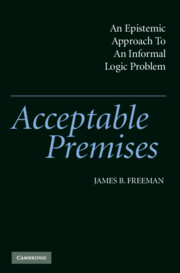Book contents
- Frontmatter
- Contents
- Preface
- Acknowledgments
- PART 1 ACCEPTABILITY: DIALECTICAL AND EPISTEMOLOGICAL COSIDERATIONS
- PART 2 STATEMENTS, BELIEF-GENERATING MECHANISMS, AND PRESUMPTIVE RELIABILITY
- 5 What Types of Statements Are There?
- 6 Necessary Statements and A Priori Intuition
- 7 Descriptions and Their Belief-Generating Mechanisms
- 8 Interpretations and Their Modes of Intuition
- 9 Evaluations and the Moral Faculties
- 10 Taking One's Word: The Interpersonal Belief-Generating Mechanism
- PART 3 PRACTICE AND PERSPECTIVE
- Notes
- References
- Index
10 - Taking One's Word: The Interpersonal Belief-Generating Mechanism
Published online by Cambridge University Press: 02 December 2009
- Frontmatter
- Contents
- Preface
- Acknowledgments
- PART 1 ACCEPTABILITY: DIALECTICAL AND EPISTEMOLOGICAL COSIDERATIONS
- PART 2 STATEMENTS, BELIEF-GENERATING MECHANISMS, AND PRESUMPTIVE RELIABILITY
- 5 What Types of Statements Are There?
- 6 Necessary Statements and A Priori Intuition
- 7 Descriptions and Their Belief-Generating Mechanisms
- 8 Interpretations and Their Modes of Intuition
- 9 Evaluations and the Moral Faculties
- 10 Taking One's Word: The Interpersonal Belief-Generating Mechanism
- PART 3 PRACTICE AND PERSPECTIVE
- Notes
- References
- Index
Summary
In Chapters 6 through 9, we surveyed the personal basic belief-generating mechanisms. These mechanisms form beliefs upon the basis either of how we are appeared to in various ways or of connections we intuit. The mechanism in this chapter, by contrast, takes beliefs ready formed by someone else and makes them our own. This is a central belief-generating mechanism for argumentation. In accepting the basic premises of an argument, in many cases, one may be taking someone's word for it, either the proponent's or someone else's. Let us begin by reflecting on just how central is taking one's word.
IMPORTANCE OF TAKING ONE'S WORD
Certain recent work in epistemology has called attention to two facts: the significant extent to which in forming our beliefs we rely on the word of others and the meager extent to which philosophers have considered this mode of forming beliefs. Simple reflection should reveal the extent to which our beliefs are formed by taking someone else's word. Coady makes this point with great persuasiveness (1992, pp. 6–7). He invites you to suppose you are visiting Amsterdam for the first time. You rely on the word of the airplane's crew that this really is Amsterdam where your plane had landed. You enter your date and place of birth on the hotel registration form. The belief that a certain date is one's birthday or that a certain place is one's place of birth is always received from others.
- Type
- Chapter
- Information
- Acceptable PremisesAn Epistemic Approach to an Informal Logic Problem, pp. 281 - 316Publisher: Cambridge University PressPrint publication year: 2004



